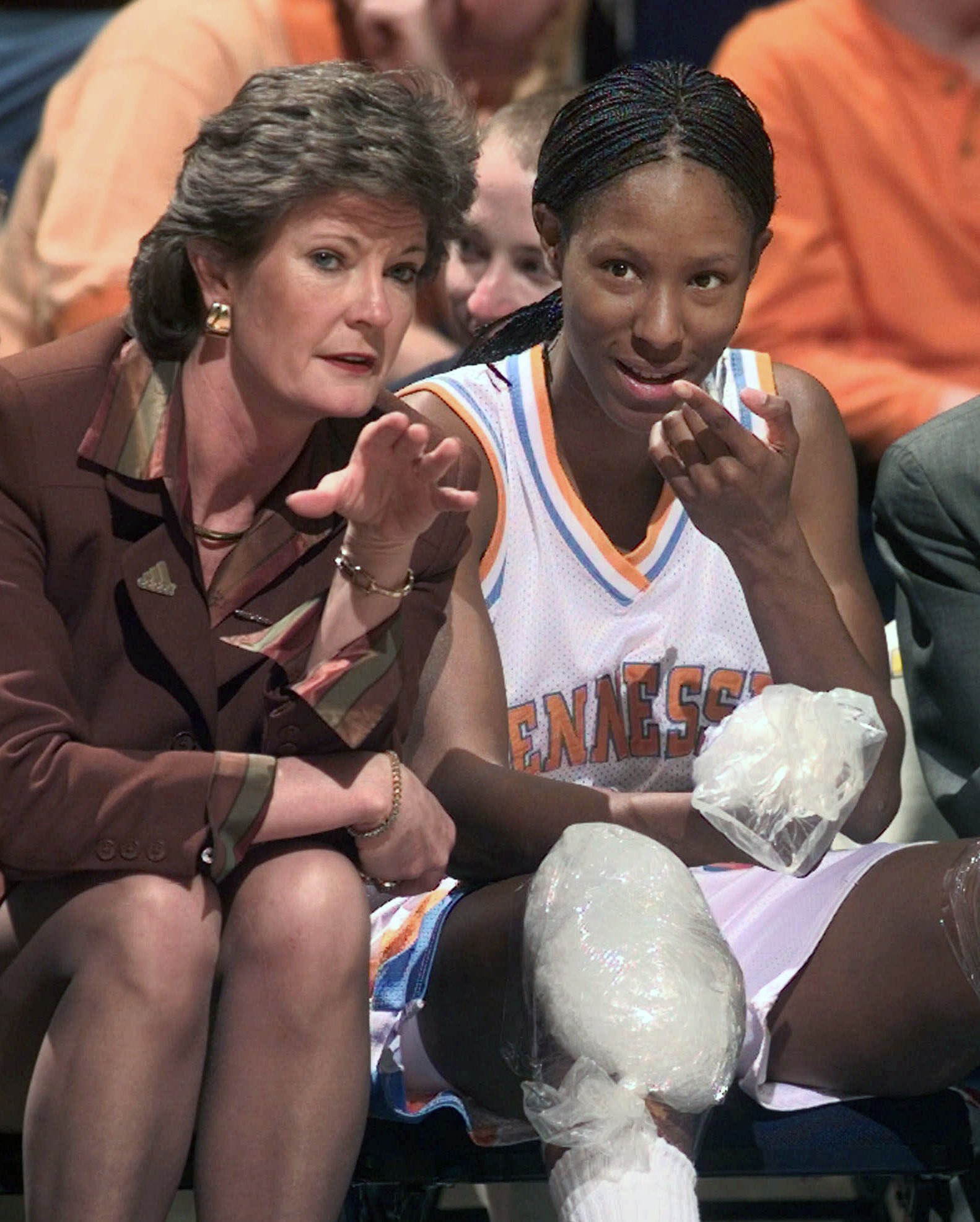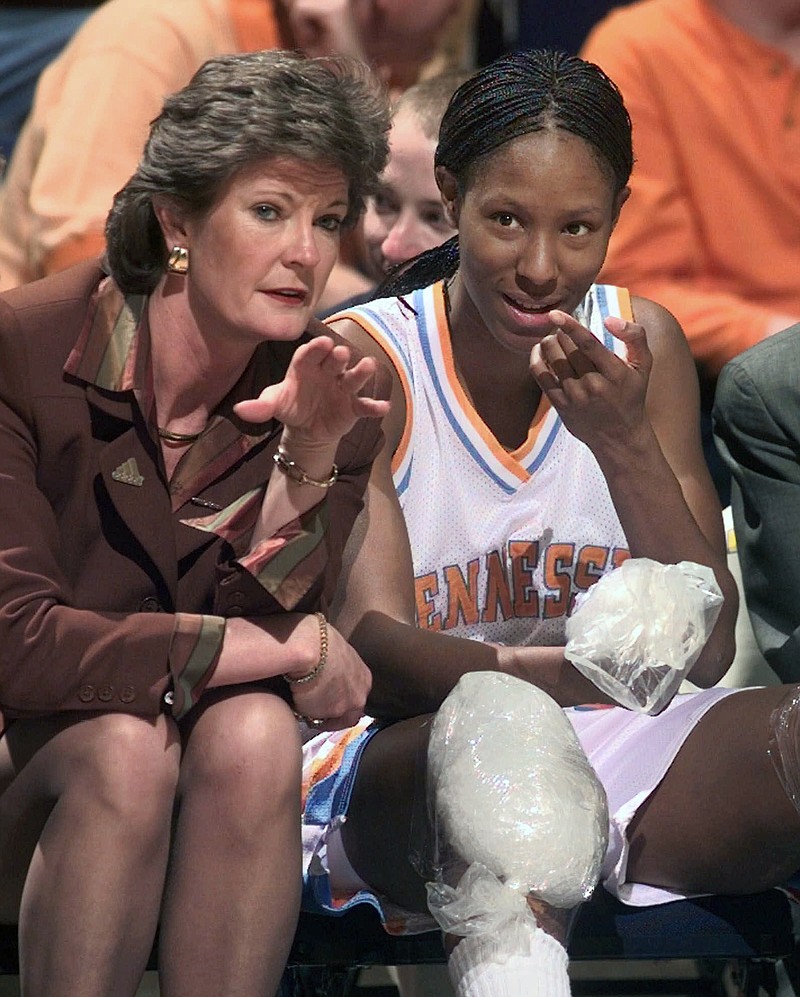Photo Gallery
Art Walk @ Argenta Arts District — 07.15
The monthly art walk features live music, local artists and food in the Argenta Arts District. Stores and shops stay open later to accommodate the public.
 In this Feb. 26, 1999, file photo, Tennessee head coach Pat Summitt talks with Chamique Holdsclaw on the bench as Holdsclaw ices her knees in the final minutes of their game against Florida at the SEC women's tournament in Chattanooga, Tenn. Summitt, the winningest coach in Division I college basketball history who uplifted the women's game from obscurity to national prominence during her career at Tennessee, died Tuesday morning, June 28, 2016. She was 64.
In this Feb. 26, 1999, file photo, Tennessee head coach Pat Summitt talks with Chamique Holdsclaw on the bench as Holdsclaw ices her knees in the final minutes of their game against Florida at the SEC women's tournament in Chattanooga, Tenn. Summitt, the winningest coach in Division I college basketball history who uplifted the women's game from obscurity to national prominence during her career at Tennessee, died Tuesday morning, June 28, 2016. She was 64.I remember the first time I met coach Summitt. My grandmother and I were in awe of how powerful and sharp she was in person when she came to my projects in Astoria, New York, to recruit me to UT.
She promised me three things that day: I would graduate college, I would always have my family and sisterhood at UT, and that she would always be there for me.
As amazing as she was as a coach she was so much more as a person. No matter what I was going through during and after my college playing days, she was there for me. I remember when I first was having issues in college, she met with me and told me, "You have to do what makes you happy." She got me the help I needed.
When things spiraled out of control when I was in D.C., having these blackouts and things, coach Summitt was knocking at my door. She spent time talking with me after the season. She wanted to make sure I was OK and getting the medical attention I needed. When I lost my grandmother, when I was really struggling with my mental illness, whenever I needed her, she was there for me. When she first went public with her battle with dementia, our UT family rallied around her, but we all believed that if anyone could beat the odds it would be coach Summitt.
She was something like a superhero to me. In the face of adversity she never showed weakness, she never backed down.
Even up until these final days, she lived up to her promise to me and I'm sure to so many others. I went to Knoxville this weekend with a heavy heart. I had received word that coach Summitt's health was declining rapidly. I did not know how I would feel when I saw her.
When I arrived, I was overwhelmed by the love and outpouring of support for coach Summitt.
My UT family was there sharing stories, laughing, crying, wanting to be there for the woman that had never let them down. I spent some time with her and I thanked her for everything she has done for me and for every other life that she touched. People came from far and wide to be there in her presence for one last time, hoping for the best, but preparing for the worst. If anyone could pull out a miracle it would be coach Summitt. But the miracle was her life and her legacy. Her incredible journey and the lives that she touched on and off the court. Her impact on the world is far greater than the game of basketball. She will forever and always be my superhero.
Thank you coach Pat Summitt.
Summitt's year-by-year record
1974-75: 16-8 1975-76: 16-11 1976-77: 28-5 (AIAW semifinals) 1977-78: 27-4 (AIAW regional first round) 1978-79: 30-9 (AIAW semifinals) 1979-80: 33-5 (AIAW runner-up) 1980-81: 25-6 (AIAW runner-up) 1981-82: 22-10 (NCAA semifinals) 1982-83: 25-8 (NCAA regional final) 1983-84: 23-10 (NCAA runner-up) 1984-85: 22-10 (NCAA regional semifinal) 1985-86: 24-10 (NCAA semifinal) 1986-87: 28-6 (NCAA champion) 1987-88: 31-3 (NCAA semifinal) 1988-89: 35-2 (NCAA champion) 1989-90: 27-6 (NCAA regional final) 1990-91: 30-5 (NCAA champion) 1991-92: 28-3 (NCAA regional semifinal) 1992-93: 29-3 (NCAA regional final) 1993-94: 31-2 (NCAA regional semifinal) 1994-95: 34-3 (NCAA runner-up) 1995-96: 32-4 (NCAA champion) 1996-97: 29-10 (NCAA champion) 1997-98: 39-0 (NCAA champion) 1998-99: 31-3 (NCAA regional final) 1999-2000: 33-4 (NCAA runner-up) 2000-01: 31-3 (NCAA regional semifinal) 2001-02: 29-5 (NCAA semifinal) 2002-03: 33-5 (NCAA runner-up) 2003-04: 31-4 (NCAA runner-up) 2004-05: 30-5 (NCAA champion) 2005-06: 31-5 (NCAA regional final) 2006-07: 34-3 (NCAA champion) 2007-08: 36-2 (NCAA champion) 2008-09: 22-11 (NCAA first round) 2009-10: 32-3 (NCAA regional semifinal) 2010-11: 34-3 (NCAA regional final) 2011-12: 27-9 (NCAA regional final)
President Barack Obama on Pat Summitt
Nobody walked off a college basketball court victorious more times than Tennessee's Pat Summitt. For four decades, she outworked her rivals, made winning an attitude, loved her players like family, and became a role model to millions of Americans, including our two daughters. Her unparalleled success includes never recording a losing season in 38 years of coaching, but also, and more importantly, a 100 percent graduation rate among her players who completed their athletic eligibility. Her legacy, however, is measured much more by the generations of young women and men who admired Pat's intense competitiveness and character, and as a result found in themselves the confidence to practice hard, play harder, and live with courage on and off the court. As Pat once said in recalling her achievements, "What I see are not the numbers. I see their faces." Pat learned early on that everyone should be treated the same. When she would play basketball against her older brothers in the family barn, they didn't treat her any differently and certainly didn't go easy on her. Later, her Hall of Fame career would tell the story of the historic progress toward equality in American athletics that she helped advance. Pat started playing college hoops before Title IX and started coaching before the NCAA recognized women's basketball as a sport. When she took the helm at Tennessee as a 22-year-old, she had to wash her players' uniforms; by the time Pat stepped down as the Lady Vols' head coach, her teams wore eight championship rings and had cut down nets in sold-out stadiums. Pat was a patriot who earned Olympic medals for America as a player and a coach, and I was honored to award her the Presidential Medal of Freedom. She was a proud Tennessean who, when she went into labor while on a recruiting visit, demanded the pilot return to Knoxville so her son could be born in her home state. And she was an inspiring fighter. Even after Alzheimer's started to soften her memory, and she began a public and brave fight against that terrible disease, Pat had the grace and perspective to remind us that "God doesn't take things away to be cruel. He takes things away to lighten us. He takes things away so we can fly." Michelle and I send our condolences to Pat Summitt's family – which includes her former players and fans on Rocky Top and across America.

